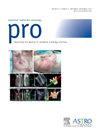Ensuring High Quality Treatment Plans with a Plan Quality Review Checklist
IF 3.4
3区 医学
Q2 ONCOLOGY
引用次数: 0
Abstract
Treatment plan quality is a crucial component for a successful outcome of radiation therapy treatments. As the complexity of radiation therapy planning and delivery techniques increases, the role of the medical physicist in assessing treatment plan quality becomes more critical. Integrating plan quality review throughout the treatment planning process allows improvements without delaying treatment or rushing to produce changes at the last minute. In this work, we aim to provide practical check items for physicists to reference when assessing treatment plan quality with a critical eye, asking questions such as “is this the best dose distribution feasible for this patient?,” “could we change any planning parameters to improve plan quality?,” and “could we change the planning strategy for this particular patient or for future patients?”; and to work with planners and physicians to create a multidisciplinary collaborative culture that achieves the best plan feasible for every patient. We tabulate the features that affect plan quality in each process step and check details for individual items. This report is aimed at medical physicists, planners, radiation oncologists, and other professionals who are involved in treatment planning.
通过计划质量审查检查确保高质量的治疗计划:计划质量审查核对表。
治疗计划的质量是放射治疗取得成功的关键因素。随着放疗计划和放疗技术复杂程度的增加,医学物理学家在评估治疗计划质量方面的作用也变得更加重要。将计划质量审查纳入整个治疗计划过程,可以在不耽误治疗或不急于在最后一刻做出修改的情况下改进计划。在这项工作中,我们旨在提供实用的检查项目,供物理学家在以批判的眼光评估治疗计划质量时参考,提出的问题包括 "这对该患者来说是可行的最佳剂量分布吗?"、"我们可以改变任何计划参数来提高计划质量吗?"以及 "我们可以为该患者或未来的患者改变计划策略吗?";并与计划人员和医生合作,创建一种多学科协作文化,为每位患者实现可行的最佳计划。我们列出了每个流程步骤中影响计划质量的特征,并检查了各个项目的细节。本报告面向医学物理学家、规划师、放射肿瘤学家和其他参与治疗规划的专业人员。
本文章由计算机程序翻译,如有差异,请以英文原文为准。
求助全文
约1分钟内获得全文
求助全文
来源期刊

Practical Radiation Oncology
Medicine-Radiology, Nuclear Medicine and Imaging
CiteScore
5.20
自引率
6.10%
发文量
177
审稿时长
34 days
期刊介绍:
The overarching mission of Practical Radiation Oncology is to improve the quality of radiation oncology practice. PRO''s purpose is to document the state of current practice, providing background for those in training and continuing education for practitioners, through discussion and illustration of new techniques, evaluation of current practices, and publication of case reports. PRO strives to provide its readers content that emphasizes knowledge "with a purpose." The content of PRO includes:
Original articles focusing on patient safety, quality measurement, or quality improvement initiatives
Original articles focusing on imaging, contouring, target delineation, simulation, treatment planning, immobilization, organ motion, and other practical issues
ASTRO guidelines, position papers, and consensus statements
Essays that highlight enriching personal experiences in caring for cancer patients and their families.
 求助内容:
求助内容: 应助结果提醒方式:
应助结果提醒方式:


